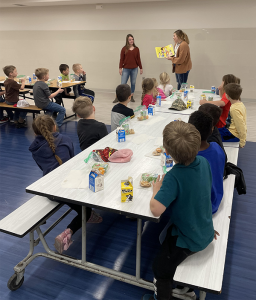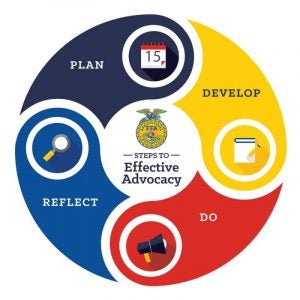When it comes to finding a passion for agriculture, it can happen at any age — riding the tractor with your dad when you are little, finding out that agriculture is the basis of so much that we do — not least of which includes our food, fiber, and fuel, or simply in joining an organization with your friends. The National FFA Organization encourages its members to share their passion and knowledge for agriculture at every opportunity they get.
According to the American Farm Bureau Foundation for Agriculture, “An agriculturally literate person understands how the agricultural industry works — not just where food comes from, but who grows it, agriculture’s effect on the economy, environment, technology, lifestyle and its relationship to livestock.”
By increasing those who fully understand the responsibilities of those involved in agriculture, we can better communicate the importance agriculture in our daily lives.
It is never too early to start educating the next generation about the importance of agriculture and everything that our industry supports. FFA members are trained on how to best teach others how agriculture is involved in other subjects like science, social studies, language arts, and math. In an effort to help spread the knowledge about agriculture, the Nebraska Farm Bureau Foundation highlighted 58 Nebraska FFA chapters and their work to increase agricultural literacy in their communities.

Earlier this month, Nebraska Farm Bureau recognized the FFA members from the different chapters during a ceremony at the Nebraska State FFA Convention. The FFA chapters participated in the Nebraska Farm Bureau Foundation’s Connecting Chapters program which equips and encourages high school FFA chapters to connect with their local elementary school to spark their interest in the agriculture industry.
“We are proud to recognize these FFA Chapters and their commitment to sharing the importance of agriculture. Agricultural literacy is not only important for educating and informing future consumers, it also inspires and equips students to explore future careers in agriculture. These students are securing the future of agriculture by being strong advocates,” said Courtney Shreve, director of outreach education.
A major part of implementing agricultural literacy comes from the four-step effective advocacy model of the National FFA Agricultural Literacy and Advocacy Platform. This program encourages students to plan, develop, do and reflect when they advocate for agriculture.

In the first step, plan, FFA members are encouraged to know their audience and understand the information they are about to present. Secondly, FFA members are supposed to develop what they want to accomplish and form their key message. Next, students should deliver their message as planned. Finally, FFA members should reflect on the outcomes to improve on future opportunities.
The Nebraska FFA Chapters put the four step plan into action by completing tasks during the school year. This includes attending training from an agricultural literacy expert, reading and donating an agriculture themed book to an elementary school classroom, planning and leading an agriculture activity in their local school, and connecting with their county Farm Bureau to learn more about the organization and build a community connection.
“When we take the Connecting Chapters activities into the elementary grades, the kids just soak up the information. They look up to the older kids and learn so much from them,” said Lisa Kemp, Wallace FFA advisor.
The National FFA Organization is also committed to increasing agricultural literacy efforts amongst FFA members. Last year, the National FFA Organization teamed up with Zoetis, the Indiana State Fair, and the LEAP Foundation for an agricultural literacy project that introduced swine production to students.
There’s a Pig in My Classroom is a virtual program designed to teach students in grades 3-6 about how pigs are raised on the farm, production terminology, and purchasing pork in the grocery store. The last virtual field trip takes place May 3 to 6, and teachers can register here.
Lining up with advocacy programming for FFA chapters, the project allowed students to share information on swine production with others and culminate with a virtual field trip to Fair Oaks Farm Pig Adventure.
Through multiple different programs and opportunities, FFA members are spreading their knowledge and passion for agriculture with younger generations. By sharing their love for the industry, they are opening up doors for the next wave of leaders.



